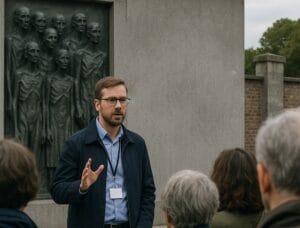Vienna, 8 May 2025 – On this significant day, marking the end of World War II, we not only remember the historical event but also acknowledge the profound responsibility it carries. Tourist Guides around the world play a crucial role in conveying history and its consequences. It is time to overcome the longstanding taboo that political and historical themes should be avoided during tours—under the pretext that guests should not be burdened with such topics while on holiday.
For too long, the assumption prevailed that political discussions had no place in tourism. This perspective is still frequently enforced by travel agencies, which often request Tourist Guides to remain “apolitical” and to avoid complex historical contexts during standard highlight tours—unless the tour specifically takes place at memorial sites. But this limitation falls short of our responsibility. The challenges of our time make it clearer than ever: understanding history, especially the atrocities of World War II and the human rights that emerged in its wake, is essential.
Human rights, as we know them today, were established as a direct response to the inhumane ideology of National Socialism. These achievements—our freedom, democratic rights, and peaceful coexistence—are not to be taken for granted. It is our collective societal duty to continually remind ourselves of this.
Tourist Guides, who visit historical sites and memorials daily, are key figures in this process. They have both the opportunity—and the responsibility—to convey the significance of these places and the lessons learned from history. Especially on symbolic dates like May 8th, we are reminded of the dangers of racial ideologies, nationalism, isolationism, and hatred.
As the World Federation of Tourist Guide Associations (WFTGA), we fully acknowledge this responsibility. We believe it is not only in memorial areas where our task lies, but also on classic city tours and highlight routes—everywhere that historical and cultural context allows—Tourist Guides should have the courage to clearly and knowledgeably address political and historical connections. Only in this way can we present a complete picture of our history and its consequences—and only in this way can we help prevent the mistakes of the past from repeating.
We are currently working intensively on a new Code of Conduct for Guiding, which will emphasise ethical responsibility and political-historical sensitivity. Together with our partners, such as the Federation of European Tourist Guides, we are promoting specialised training in Dark Tourism and politically sensitive tours. These initiatives aim to prepare guides to approach challenging historical themes responsibly and knowledgeably.
Earlier this year, I had the honour of speaking in Washington about the ethical responsibility of Tourist Guides. The overwhelming response demonstrated how vital and relevant this topic is. We also plan to further explore this focus at the next WFTGA Convention, which will take place in Japan in 2026.
We firmly believe that Tourist Guides are not just storytellers; they are bridge builders and keepers of collective memory. In a world that is increasingly polarised, we bear the responsibility to foster understanding, empathy, and respect—not only at memorial sites but everywhere that history is brought to life.
Sebastian Frankenberger
President of the World Federation of Tourist Guide Associations (WFTGA)

